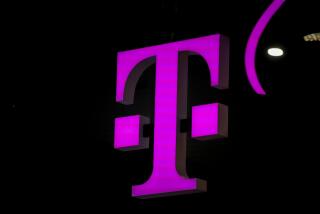Verizon to buy Vodafone’s 45% stake in Verizon Wireless
In one of the largest deals in global corporate history, Verizon Communications Inc. agreed to pay $130 billion to buy Vodafone Group’s 45% stake in Verizon Wireless and take full control of the nation’s top wireless carrier.
The deal would put to an end a joint venture launched by the two telecom giants in 2000 after a string of mergers that had altered the contours of the mobile-phone industry. Verizon had made repeated attempts during that time to acquire Vodafone’s stake, but the two could not agree on price.
In an era of ubiquitous cellular service and fast-rising use of smartphones, Verizon was eager to take hold of a business with big challenges but equally significant potential. The wireless business is expected to be paced in coming years by growing demand for video and other premium services, despite heavy competition and slowing subscriber growth.
“This is great news for Verizon on many fronts,” said Jeff Kagan, an independent technology industry analyst. “One of which is the world is rapidly moving toward wireless, and there are still enormous opportunities for growth going forward.”
The buyout is not expected to have an immediate effect on the wireless provider’s nearly 100 million subscribers in terms of monthly fees or new services.
Profits for wireless companies boomed in the last decade as Americans scrambled to get mobile telephone service, and then snapped up tablets and smartphones. That subscriber growth has waned in recent years as the number of people getting service peaked.
Verizon is making a big bet that Americans will increasingly rely on their mobile devices in the coming years, using more complex services on their smartphones and tablets. Wireless providers also hope that consumers will use their devices for nontraditional functions, such as an elderly person using a home medical device that sends signals directly to a doctor’s office.
“These assets position us for the rapidly increasing customer demand for video, machine to machine and big data,” said Lowell McAdam, Verizon’s chief executive. “We are confident of further growth in wireless and our business in its entirety.”
The complex transaction calls for Verizon to shell out $58.9 billion in cash, the largest ever in such a deal, and $60.2 billion in stock. The agreement also calls for several smaller financial arrangements, including Verizon selling back its small stake in Vodafone’s European division.
Vodafone shareholders would receive the biggest windfall. The British company plans to return a larger-than-expected $84 billion to investors in a combination of cash and Verizon stock.
Shareholders would receive all the Verizon shares, plus $23.9 billion in cash. That could be a boon to the British economy, which has suffered through lean economic times.
Wall Street will be a huge beneficiary, reaping hundreds of millions of dollars in fees for advising the two companies.
The agreement is not expected to face antitrust competition because Verizon already controls the wireless company.
Verizon controlled the partnership with Vodafone and had wide leeway to make strategic decisions. Owning all of Verizon Wireless would allow the American phone giant to consolidate as a single company and receive the financial benefit of the expected growth.
Verizon Wireless is the largest U.S. carrier in overall market share. And in smartphones, Verizon holds a 36.9%-to-26.5% edge over rival AT&T; Inc., according to Kantar Worldpanel ComTech.
Verizon also announced that it will increase its dividend 6 cents a year, to $2.12, from $2.06. The stock closed Friday at $47.38 ahead of the holiday weekend.
The buyout is the latest sign of the consolidation that has swept through the wireless industry in the last decade. Verizon’s primary wireless competitor, AT&T;, is considered a potential suitor for British-based Vodafone.
More to Read
Inside the business of entertainment
The Wide Shot brings you news, analysis and insights on everything from streaming wars to production — and what it all means for the future.
You may occasionally receive promotional content from the Los Angeles Times.










